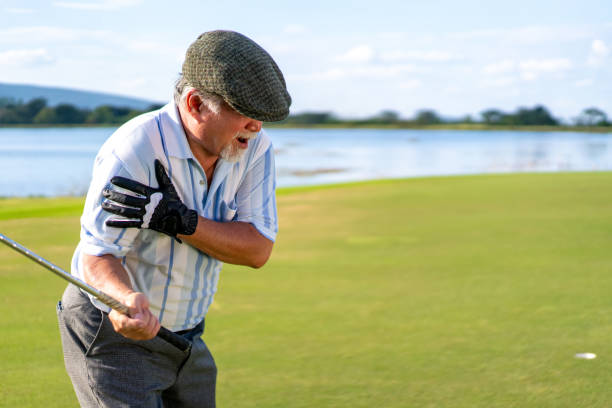Golf Injury in St. George, UT

Golf Injury Rehabilitation in St. George, UT
Golf requires a combination of strength, flexibility, and technique. When pain or injury limits your swing, it’s more than discomfort—it’s time lost from the game you love. At Scratch Physical Therapy and Wellness, our specialized golf rehabilitation program restores mobility, prevents future injuries, and helps you get back on the course without delay.
Effective Treatment for Common Golf Injuries in St. George, Utah
Lower Back Pain
The repetitive rotational forces in golf can place significant stress on your lumbar spine. Lower back pain often develops from improper swing mechanics, limited thoracic mobility, or weak core stability. Our targeted approach combines manual therapy and specific exercises to address muscle imbalances, improve spinal mobility, and strengthen your core to prevent future injuries.
Shoulder Impingements
Golf’s demanding swing motion can lead to shoulder impingement syndrome, particularly affecting the lead shoulder. This condition occurs when the rotator cuff tendons become compressed during the backswing and follow-through. We focus on improving shoulder mobility, strengthening the rotator cuff muscles, and correcting swing mechanics to reduce stress on the joint.
Elbow Conditions
Golfer’s elbow (medial epicondylitis) and tennis elbow (lateral epicondylitis) are common overuse injuries that can severely impact your game. These conditions typically result from grip pressure issues or swing mechanics that place excessive stress on the forearm muscles. Our treatment combines specific soft tissue techniques, eccentric strengthening exercises, and grip modification strategies.
Wrist and Hand Issues
The golf grip is crucial for control and power, but improper technique can lead to wrist tendinitis and hand strain. We address these issues through detailed grip analysis, targeted strengthening exercises, and technique modification to ensure proper wrist positioning throughout the swing.
Hip and Knee Problems
Proper weight transfer and rotational movements in golf require optimal hip and knee function. When these joints are compromised, it can lead to compensatory movements and reduced power. Our treatment focuses on improving joint mobility, strengthening supporting muscles, and ensuring proper weight transfer patterns during the swing.
Don’t let these common golf injuries keep you from enjoying the game you love. At Scratch Physical Therapy and Wellness, we understand that each golfer’s body, swing, and injuries are unique. Our comprehensive treatment approach addresses not only your immediate pain but also the underlying movement patterns that may be contributing to your injury. Through early intervention and specialized care, we can help you return to the course stronger and more efficient than before, ensuring you can continue playing the game you love for years to come.
How Golf Rehab Improves Performance
1. Injury Treatment and Pain Management
We use hands-on therapy, mobility exercises, and corrective techniques to reduce discomfort and restore function.
2. Swing Analysis and Mechanics Correction
Video analysis helps identify:
- Inefficient movement patterns
- Postural imbalances
- Improper weight shifts
3. Strength and Flexibility Training
We focus on:
- Core stability for better rotation
- Shoulder mobility for a smoother swing
- Hip and knee strength for improved balance
Frequently Asked Questions
Can therapy improve my golf swing?
Yes. Improved mobility, strength, and posture directly enhance swing efficiency, control, and power. Physical therapy for golf focuses on optimizing the kinetic chain – the coordinated sequence of muscle activations that transfer energy from the ground through your body and into the club. Through targeted exercises and manual therapy techniques, therapists address limitations in thoracic spine rotation, hip mobility, and core stability that may be compromising your swing mechanics. Treatment typically incorporates neuromuscular reeducation to improve proprioception (body awareness) and motor control, allowing for more consistent club path and face control. Additionally, therapy can correct muscular imbalances that develop from the repetitive nature of golf, helping prevent future injuries while maximizing power generation through improved ground force reactions.
How long does recovery take?
Many golfers experience noticeable improvement within a few weeks, depending on the severity of the injury and consistency of therapy. The rehabilitation timeline varies based on multiple physiological factors, including the type and extent of tissue damage, the individual’s age and overall health status, and their adherence to the prescribed exercise program. Acute injuries like muscle strains may resolve in 2-6 weeks with appropriate treatment, while chronic conditions such as tendinopathy or arthritis require longer-term management strategies. Recovery progression follows established tissue healing phases: the inflammatory phase (0-72 hours), proliferation phase (72 hours to 6 weeks), and remodeling phase (6 weeks to 12 months). Each phase requires specific interventions and loading parameters to optimize healing while preventing re-injury. Regular reassessment allows therapists to modify treatment plans based on objective measures of strength, range of motion, and functional performance.
Do I need to stop playing during treatment?
Not always. We’ll assess your condition and recommend safe modifications to keep you active while you recover. The decision to continue playing is based on a comprehensive evaluation of tissue irritability, movement impairments, and the risk of exacerbating the injury. Modified swing patterns, reduced playing frequency, or limiting the number of holes played may be recommended during early rehabilitation phases. Treatment often incorporates golf-specific movement analysis to identify compensatory patterns that could impede recovery or lead to secondary injuries. Your therapist will establish clear clinical milestones that must be achieved before progressing to more demanding golf activities. This may include meeting specific strength benchmarks, demonstrating proper movement patterns, or achieving adequate joint mobility. A graduated return-to-play protocol ensures optimal tissue adaptation while maintaining your connection to the game.
Meet Your Golf Rehabilitation Specialists
Dr. Cliff Snyder, PT, DPT brings over 15 years of comprehensive sports medicine and rehabilitation expertise to his role as founder of Scratch Physical Therapy and Wellness. His academic journey began with foundational studies in sports and exercise science at the University of Utah and University of Puget Sound, culminating in his Doctorate of Physical Therapy from Western University of Health Sciences in 2019. This robust educational background, combined with his hands-on clinical experience, enables him to deliver innovative therapeutic solutions while maintaining the highest standards of patient care.
As a Level II certified Titleist Performance Institute professional, Dr. Snyder specializes in golf-specific rehabilitation and performance enhancement. His advanced training in functional movement assessment and biomechanics allows him to develop comprehensive treatment strategies that address both immediate concerns and long-term athletic goals. This specialized expertise, coupled with his patient-centered approach, ensures that each rehabilitation plan is carefully tailored to meet individual needs while promoting optimal recovery outcomes.
Since obtaining his physical therapy license in January 2020, Dr. Snyder has dedicated himself to advancing the field of physical therapy through evidence-based practice and individualized care strategies. His commitment to patient wellness extends beyond traditional rehabilitation, incorporating innovative techniques and comprehensive movement assessments to help clients achieve their full potential. At Scratch Physical Therapy and Wellness, Dr. Snyder continues to demonstrate his passion for healthcare excellence while guiding patients through their journey to recovery and improved performance.
Start Playing Pain-Free Again
Ready to improve your game and play without limitations? Schedule your comprehensive golf assessment at Scratch Physical Therapy and Wellness in St. George, UT. Whether you’re dealing with nagging injuries or looking to enhance your performance, our specialized golf rehabilitation programs can help you get back to playing your best golf. Call (435) 817-5272 or visit our clinic at 476 E Riverside Dr STE. B7 – we’re open Monday through Sunday, 7 AM to 6 PM, to accommodate your schedule.
About the Author
Dr. Cliff Snyder, Owner & Physical Therapist, specializes in golf injury prevention and rehabilitation, helping players improve mobility and performance at Scratch Physical Therapy and Wellness in St. George, UT. With over 15 years of experience in sports and exercise science and advanced certification as a Level II Titleist Performance Institute professional, Dr. Snyder brings a comprehensive approach to golf rehabilitation. His unique methodology combines evidence-based physical therapy techniques with specialized golf biomechanics knowledge, allowing him to develop personalized treatment plans that address both immediate pain relief and long-term performance enhancement. After earning his Doctorate of Physical Therapy from Western University of Health Sciences in 2019, Dr. Snyder has dedicated his practice to helping golfers of all skill levels overcome injuries, improve their swing mechanics, and return to the course with greater confidence and capability. His patient-centered approach ensures that each golfer receives individualized attention and a carefully crafted rehabilitation strategy that aligns with their specific goals and playing demands.


